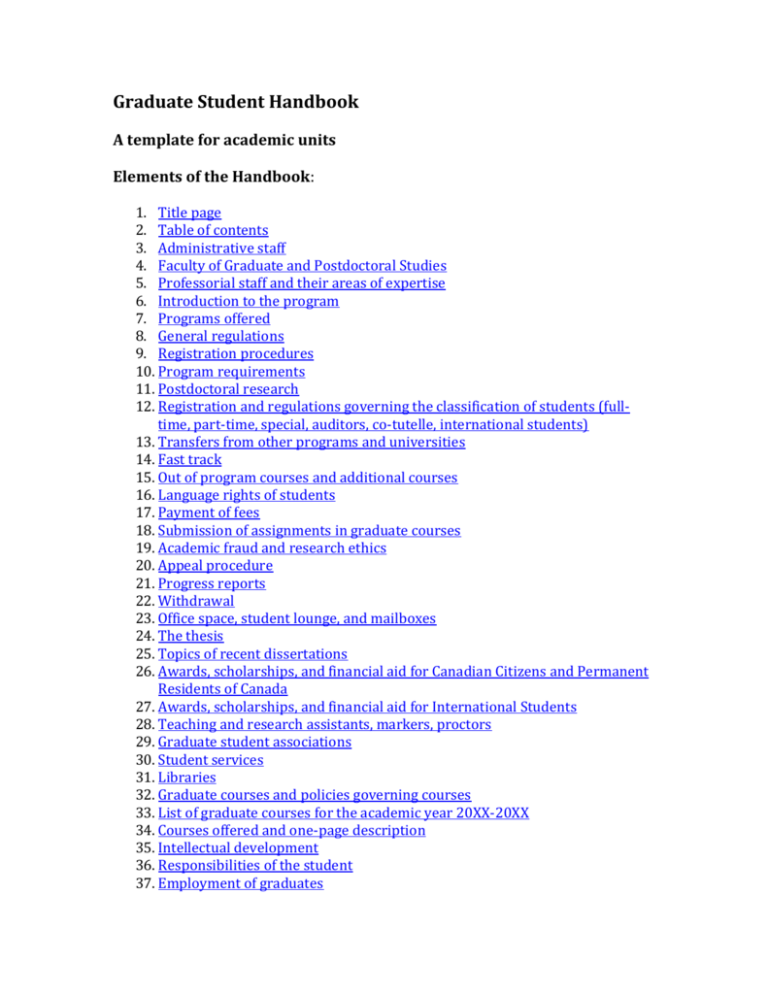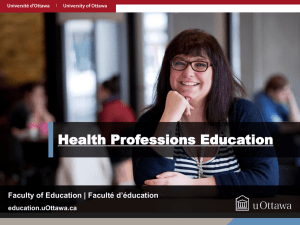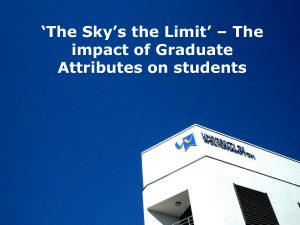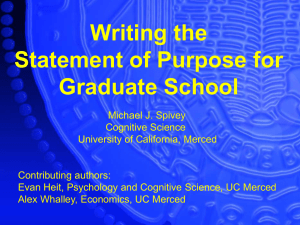Graduate Handbook - Faculty of Graduate and Postdoctoral Studies
advertisement

Graduate Student Handbook A template for academic units Elements of the Handbook: 1. Title page 2. Table of contents 3. Administrative staff 4. Faculty of Graduate and Postdoctoral Studies 5. Professorial staff and their areas of expertise 6. Introduction to the program 7. Programs offered 8. General regulations 9. Registration procedures 10. Program requirements 11. Postdoctoral research 12. Registration and regulations governing the classification of students (fulltime, part-time, special, auditors, co-tutelle, international students) 13. Transfers from other programs and universities 14. Fast track 15. Out of program courses and additional courses 16. Language rights of students 17. Payment of fees 18. Submission of assignments in graduate courses 19. Academic fraud and research ethics 20. Appeal procedure 21. Progress reports 22. Withdrawal 23. Office space, student lounge, and mailboxes 24. The thesis 25. Topics of recent dissertations 26. Awards, scholarships, and financial aid for Canadian Citizens and Permanent Residents of Canada 27. Awards, scholarships, and financial aid for International Students 28. Teaching and research assistants, markers, proctors 29. Graduate student associations 30. Student services 31. Libraries 32. Graduate courses and policies governing courses 33. List of graduate courses for the academic year 20XX-20XX 34. Courses offered and one-page description 35. Intellectual development 36. Responsibilities of the student 37. Employment of graduates 2 38. Recent publications of professorial staff 39. Recent publications of students 40. List of forms: progress report, supervisory; withdrawal; illness; leave of absence; extension of time limit; OVGS (Ontario Visiting Graduate Student Form); letter of permission; travel grant application; etc. 41. Varia Nota bene: General information, common to all academic units, is indicated in blue font. 3 1. Title page Information on this page should include the following: Program, academic year, address, email, website, contact information, location: e.g. University of Ottawa Department/School/Institute/Faculty of ABC Graduate Studies Academic Year (e.g. 2010-2011) www.faculty.uOttawa.ca/academicunit/program Street address Ottawa, Ontario K1N 6N5 Name, telephone number, and e-mail coordinates of graduate academic assistant, graduate program director, and faculty graduate administrator. 2. Table of contents Adjust the Table of Contents according to the program’s needs, adding or subtracting as necessary, from the elements of this template. 3. Administrative staff List and provide the coordinates (e-mail, phone extensions, office numbers) of the chair of the department/school or dean of faculty (as appropriate), director of graduate studies, academic assistant, secretarial staff, vice-dean or administrator of graduate studies of the faculty. Specify the role of all the staff in the secretariat. Note location and business hours of the graduate secretariat. 4. Faculty of Graduate and Postdoctoral Studies Under the authority of the Senate, the Faculty of Graduate and Postdoctoral Studies (FGPS) is responsible for overseeing and coordinating the administration of all graduate and postdoctoral programs. The FGPS is governed by a council which determines the general policies and plans for the development of the faculty, establishes the general regulations of the faculty, and defines the functions of its ancillary commissions and committees. www.grad.uOttawa.ca The FGPS is located at 115 Séraphin-Marion (Hagen Hall). Tel: (613) 562-5742 Fax: (613) 562-5992 4 Tel: (613) 562-5742 Fax: (613) 562-5992 Officers of the FGPS and their responsibilities: Dean deangrad@uOttawa.ca Vice-Dean vdgrad@uOttawa.ca Evaluation of graduate programs; graduate student conference travel grants; on-campus conference grants for graduate students; administration of Policy 110 (treatment of graduate students on non-academic and non-employment issues, excluding sexual harassment) web5.uOttawa.ca/admingov/policy_110.html Associate Dean, Interdisciplinary Studies and International International matters; interdisciplinary programs; postdoctoral fellows; research associates. Assistant Dean and Secretary General General regulations of the FGPS and requests for major exceptions; FGPS calendar; academic integrity breaches. Associate Registrar All matters pertaining to admissions, registrations, scholarships, systems and management of thesis evaluations and defences. Scholarships Humanities Awards Officer Sciences Awards Officer Thesis Office Head, Thesis Office Admissions Registration, Records of Academic Performance Records Chief Administrative Officer 5. Professorial staff 5 List of all faculty members involved in the program with their coordinates (e-mail, phone extensions, office numbers) and the areas of expertise in which they will supervise graduate students. Provide links to professors’ websites. Full members of the FGPS marked with a double asterisk; single asterisk for Master’s supervision and/or cosupervision at the doctoral level. Emeritus and adjunct professors listed separately. Identify professors who are members of collaborative and/or interdisciplinary programs. Identify the members of the Graduate Program Committee. List their responsibilities. 6. Introduction to the program (one to two pages). Aims and objectives of the program(s), the fields and concentrations (if applicable); brief history, program rating (if appropriate), accreditation or details about aspects of the program that may lead to professional accreditation (if appropriate). 7. Programs offered (one to two pages) The programs offered (e.g. MA with thesis, MA with research project, MA by coursework, PhD, certificate, collaborative, joint, combined, etc.) and a paragraph describing the objectives of each of the programs. This should be identical to the information offered in the graduate calendar and updated at the same time. 8. General regulations See the FGPS website for general regulations governing all graduate programs (passing grade, number of credits per course, examinations, etc): www.grad.uOttawa.ca/Default.aspx?tabid=1807&monControl=Examens 9. Registration procedures: Registration procedures may be found at www.grad.uOttawa.ca/Default.aspx?tabid=1613 Add any important details regarding registration. 10. Program requirements: Provide detailed, precise information on each of the programs offered: Master’s, PhD, certificate, collaborative, joint or other programs, including Admission requirements 6 Course requirements residency requirements language requirements (if any) examinations and or comprehensives co-op option if that exists thesis proposal and thesis defence - the exact process should be indicated typical sequence, session by session, for each program, course of study. Suggestion: Put this information into chart form. time limits for each degree and typical or average or median times to completion Provide a summary of important deadlines for program requirements 11. Postdoctoral research The University of Ottawa recognizes three types of post-PhD appointments: postdoctoral fellows, postdoctoral assistants, and research associates. These are defined in detail on the FGPS website. Also, see below. Both postdoctoral fellows and postdoctoral assistants must meet the following criteria: the appointee was recently (within five years) awarded a PhD or the equivalent; the appointment is of a limited duration; the appointment involves substantial full-time research or scholarship; the appointment is viewed as preparatory for a full-time academic and/or research career and not as a source of continuing employment; the appointee works under the supervision of a faculty mentor at the University or one of its affiliated institutes; the appointee has the freedom, and is expected, to publish the results of his or her research or scholarship during the period of the appointment. The minimum salary of a PDF and a PDA is $32,000. The difference between the two is that the PDF is in a professor/student relationship; the PDA in an 7 employer/employee relationship. A detailed comparison of the two appointments may be found at www.grad.uOttawa.ca/Default.aspx?tabid=1415 Procedures for applying for a fellowship, responsibilities of the PDF/PDA, dispute resolution procedures, and most frequently asked questions may be found at www.grad.uOttawa.ca/Default.aspx?tabid=1412 Please note that all fellows must register with the Faculty of Graduate and Postdoctoral Studies and must complete the Postdoctoral Fellow Academic Program. Details may be found at www.grad.uOttawa.ca/Default.aspx?tabid=2434 Visit the Postdoctoral Association of the University of Ottawa at: sites.google.com/site/uOttawapda Unlike PDFs, who are regarded as trainees in short-term appointments, Research Associates have contractual positions. Depending upon the availability of funds and the recommendation of the supervisor, these contracts may be renewed an indefinite number of times. For more details see: www.etudesup.uOttawa.ca/Default.aspx?tabid=1411 Provide any program-specific details pertinent to PDFs here (e.g. application procedures, contacts, etc.) 12. Registration and regulations governing the classification of students For more details on the classification of students, see www.grad.uOttawa.ca/Default.aspx?tabid=1807&monControl=Inscription Full-time students must: a) be pursuing their studies as a full-time occupation b) identify themselves as full-time graduate students c) be designated by the university as full-time graduate students d) be geographically available and visit the campus regularly e) be considered to be a full-time graduate student by his supervisor. Nota bene: Full-time students do not work more than 10 hours per week (on campus or outside campus) Complete details may be found at www.grad.uOttawa.ca/Default.aspx?tabid=1807&monControl=Inscription Part-time students All registered graduate students who do not meet the requirements of full-time status as defined above are part-time graduate students. Part-time students cannot 8 be registered in more than six credits per session. The following are the equivalent of two three-credit courses: thesis, major paper, research activity, comprehensive examination or full (six-credit) course. Special students The category of special student is intended for those who wish to take certain graduate courses without intending to complete a graduate degree and without being subject to the requirements of a particular graduate program. Special students may enroll in graduate courses provided they obtain the approval of the academic unit concerned and of the Faculty of Graduate and Postdoctoral Studies. They must comply with regulations pertaining to the courses for which they register, such as attendance requirements, assignments, examinations and passing grades. Auditors Students wishing to attend courses without completing assignments and writing examinations must register as auditors. Auditor status must be indicated at the time of registration, from the beginning of the session in which the course is offered. Changes from auditor to credit status, or vice versa, are not accepted after the closing date for course changes of the session concerned. For courses that have been audited, the student's official transcript will show the notation "AUD". Auditors are subject to the attendance requirements set for the course. Co-tutelle (PhD only) Thesis students may enroll in a co-tutelle program, which involves full-time registration in two different institutions, usually in two different countries. Details may be obtained by contacting the Associate Dean, Interdisciplinary Studies: interdis@uOttawa.ca International Students The International Office is located at 538 King Edward Avenue, tel. 613-562-5847. For frequently asked questions, including financial aid, see: www.international.uOttawa.ca/en/students/faq.html For documents (Government, including Revenue Canada, permits, visas, health services, etc) see: www.international.uOttawa.ca/en/students/intl.html 13. Transfers from other programs and universities All students are normally expected to complete the major part of their program requirements while registered in the program at the University of Ottawa. Details about equivalencies and transfers may be found at 9 www.grad.uOttawa.ca/Default.aspx?tabid=1807&monControl=Exigences 14. Fast track (if applicable) Describe the procedure for fast-tracking from the Master’s to the PhD (if applicable) 15. Out of program courses and additional courses In any given session, graduate students may, while enrolled in a program, register for a maximum of two courses (six credits) not required for their program, provided they have the approval of their academic unit and the Faculty of Graduate and Postdoctoral Studies. These courses are identified as "out-of-program" at registration and cannot subsequently be credited towards the program. Additional fees apply. 16. Language rights of students a) All students have the right to use French or English in their dealings with the central administration and the general services of the University, as well as with the administration of the faculty or school in which they are registered. b) All students have the right to require that a course in which they are registered shall be given in the language used to describe the course in the current calendar. c) Except in language courses and courses in Français and English, all students have the right to produce their work and to answer examination questions in the official language of their choice. d) The faculty recognizes that, for academic reasons, students may be required to read some of their course material in French in a course given in English, and vice-versa. e) Except in cases justified by the nature of the course, students must produce their work and answer examination questions either in English or in French, this being an essential component of education at the University of Ottawa. 17. Payment of fees Tuition and incidental fees are subject to annual adjustment by the Board of Governors of the University. Fees rate and regulations are posted on the Web at the following address: www.uOttawa.ca/academic/info/regist/fees/fees.htm Promissory Notes: Full-time graduate students holding assistantships at the University of Ottawa may get their tuition fees and other University of Ottawa 10 expenses completely or partially deducted from their salaries, interest-free. Students are encouraged not to wait for an invoice from the University to make this financial arrangement, but rather to complete a promissory note available at the Awards Office (HGN 104) 24 hours after registration, and to bring all current, duly completed contracts with them. 18. Submission of assignments in graduate courses. Explanation of regulations (e.g. all assignments to be submitted no later than the last day of the term in which the course ends). Explanation of DFR, INC, etc. and consequences. Program policies relating to late submission, documentation in case of illness, electronic versus paper submission, need to submit new paper for each course, working in groups or independently. See item 40, below (forms). 19. Academic fraud and research ethics On research ethics and intellectual property see: www.etudesup.uOttawa.ca/Default.aspx?tabid=1378 20. Appeal procedure General regulations of the University, including examinations, grading, and appeals: www.etudesup.uOttawa.ca/Default.aspx?tabid=1807&monControl=Examens Provide a description of the appeal procedure (including for plagiarism, failure in courses, comprehensives, and other aspects of the program) in the academic unit and or the faculty concerned. Student rights and appeals: The GSAÉD assists graduate students with appeals. See: en.gsaed.ca/index.php?section_id=25 Student Appeal Centre. www.sfuo.ca/services/appeals/en/index.html The Student Appeal Centre (SAC) is a service provided free of charge to all students at the University of Ottawa. The SAC offers help and support to students who wish to appeal decisions made by the administration of the University of Ottawa. See : www.sfuo.ca/services/appeals/en/index.html In the very near future: Add a link to the Office of the Ombudsman. 21. Progress Reports Explain how “Satisfactory Progress” is defined; the consequences of unsatisfactory progress; the key role of the annual report, frequent meetings with the supervisor and or the thesis advisory committee (if it exists). See item 40 (below) for forms. 11 22. Withdrawal Students wishing to withdraw from courses or from a program must inform their academic unit and the Faculty of Graduate and Postdoctoral Studies in writing prior to the closing dates. For courses that begin and end on dates other than those indicated in the sessional dates, please consult the academic unit concerned or the FGPS concerning the last day for withdrawal. Courses dropped after the closing dates, as well as courses dropped without proper notice, appear on the student's record with the notation "INC" (incomplete) or "ABS" (absent), which is equivalent to a failing grade. 23. Office space, student lounge, and mail boxes Describe the policy governing space allocation and mailboxes. Indicate where the student lounge is located. Indicate other student study spaces (e.g. 6th floor of the Morisset Library). 24. The Thesis A. See the General regulations of the FGPS: www.grad.uOttawa.ca/Default.aspx?tabid=1807. B. A general guide for the preparation of Master’s and doctoral theses, as well as a list of frequently-asked questions may be found at www.grad.uOttawa.ca/Default.aspx?tabid=1372. Refer students to these guides. Add any program-specific points. Clarify role of “editing” for research papers and thesis. Provide links to and titles of guidebooks and style manuals specific to the discipline. C. Provide details about how and when to submit the thesis proposal; regulations for proposal defence and consequences of failure (if applicable). Provide details about expectations. D. Best practice suggestion: Prepare a“Thesis Binder” with sample proposals and keep it in the graduate assistant’s office for reference by students; E. Describe the procedure and timing for choosing a thesis supervisor; the obligations of the supervisor and the student. See the FGPS regulations at www.grad.uOttawa.ca/Default.aspx?tabid=1373. If more than one type of thesis is permissible, describe (e.g. thesis by article format;) F. Describe the thesis evaluation process, including the process of selection of external examiners and the rights of students to be consulted G. E-theses. 12 25. Topics of recent dissertations Provide a selection of recently-defended thesis topics and their supervisors. List recent thesis prize winners (You must get their permission to list their names in this handbook). See the information about Master’s and PhD prizes at www.etudesup.uOttawa.ca/Default.aspx?tabid=1380. 26. Awards, scholarships and financial aid for Canadian Citizens and Permanent Residents of Canada A) Admission scholarships (www.etudesup.uOttawa.ca/Default.aspx?tabid=1472) Please add any program-specific details concerning funding. Master’s with Thesis The University of Ottawa offers financial assistance of at least $30,000, i.e. at least $15,000/yr over a period of two years. The admission scholarship will be given on the recommendation of the academic unit to any student whose admission average is 8.0/10 or more and who registers full-time for the duration of the scholarship (6 consecutive sessions). Some academic units require an admission average higher than the FGPS minimum of 8.0/10. Please consult your academic unit about this. This financial support includes: $7,500 paid by the Faculty of Graduate and Postdoctoral Studies per year. A matching component offered by the Academic Unit in form of Assistantships or soft-funded scholarships worth at least $7,500 per year. Many programs offer more than the minimum in funding. Please consult with your academic unit for more information. Master’s with Research Paper or Research Project The University of Ottawa offers financial assistance of at least $15,000 for one year. The admission scholarship will be given on the recommendation of the academic unit to any student whose admission average is 8.0/10 or more and who registers full-time for the duration of the scholarship (3 consecutive sessions). Some academic units require an admission average higher than the FGPS minimum of 8.0/10(please consult your academic unit about this). This financial support includes: 13 $7,500 paid by the Faculty of Graduate and Postdoctoral Studies. A matching component offered by the Academic Unit in form of Assistantships or soft-funded scholarships worth at least $7,500. Many programs offer more than the minimum in funding (please consult with your academic unit for more information). The following Master’s degrees of a professional nature, comprised for the most part of courses, are specifically excluded: Business Administration (MBA), Education (MEd), Engineering (MEng) and (MEng [Engineering Management]), Health Administration (MHA) and Conference Interpreting (MCI). The PhD The University of Ottawa will provide financial assistance of at least $72,000, i.e. a minimum of $18,000/yr over a period of four years. The admission scholarship will be given automatically to any student whose admission average is 8.0 / 10 or more and who registers full-time without interruption for the duration of the scholarship (12 consecutive sessions). This financial support includes: $9,000 paid by the Faculty of Graduate and Postdoctoral Studies per year. A matching component offered by the Academic Unit in form of Assistantships or soft-funded scholarships worth at least $9,000 per year. Many programs offer more than the minimum in funding. Please consult with your academic unit for more information. Please provide more program specific details, where appropriate. B) Excellence scholarships (www.grad.uOttawa.ca/Default.aspx?tabid=3585) Admission scholarship recipients who receive an external award must inform the academic unit and the Graduate Awards Office. Such award recipients will receive the equivalent of tuition fee coverage from the University. C) Dean’s scholarship (www.grad.uOttawa.ca/Default.aspx?tabid=1473) All students enrolled in an eligible program who are registered full-time for the entire duration of their studies without interruption (except for approved parental and medical leaves) are eligible for a Dean’s Scholarship. The Dean’s Scholarship is applicable to all Canadian and Permanent Resident students, regardless of whether they hold an Admission Scholarship. However, their program of studies must have begun in May 2006 or later. 14 To receive a Dean's Scholarship, students will have to complete their degrees in accordance with the following tables: The Master’s with Thesis LUMP SUM PAYMENT DELAY TO COMPLETE THE DEGREE $1,500 6 sessions or less $1,000 7 sessions $500 8 sessions The Non-Professional Type Master’s LUMP SUM PAYMENT DELAY TO COMPLETE THE DEGREE $500 6 sessions or less LUMP SUM PAYMENT DELAY TO COMPLETE THE DEGREE $3,000 12 sessions or less $2,500 13 sessions $2,000 14 sessions $1,500 15 sessions The PhD * The Faculty considers that a degree is completed when the student submits the version of his or her thesis that was used for the oral defense. D) Student Mobility Bursaries New PhD students may receive a $4,000 Student Mobility Bursary if they have received the University of Ottawa Admission Scholarship, and will spend at least one session in a foreign institution in either year 3 or year 4 of their programs. For more details on scholarships, awards, and bursaries, see: www.etudesup.uOttawa.ca/Default.aspx?tabid=1473 Detail any special internal, endowed awards, internal conference grants (from the department or faculty). 15 E) External granting agencies (include only those sites appropriate for your program) Social Sciences and Humanities Research Council (www.sshrc.ca) Natural Sciences and Engineering Research Council of Canada (www.nserc-crsng.gc.ca) Canadian Institutes of Health Research (www.cihr-irsc.gc.ca) Ontario Graduate Scholarships: (osap.gov.on.ca/eng/Not_Secure/Plan_Grants_full_sepapp_OGS_12345.htm) Ontario Graduate Scholarships in Science and Technology Fonds québécois de la recherche sur la société et la culture (www.frqsc.gouv.qc.ca) Fonds québécois de la recherche sur la nature et les technologies (www.fqrnt.gouv.qc.ca) Fonds de la recherche en santé du Québec (www.frsq.gouv.qc.ca) Add the approximate deadlines for external awards (available at www.grad.uOttawa.ca/awards). F) Financial Aid 1) For governmental programs, by province, as well as work-study programs, see: www.etudesup.uOttawa.ca/Default.aspx?tabid=1468 2) Financial Aid office at the University: 85 University St., Room 102, tel.613 562-5734. For details see: www.loansandawards.uOttawa.ca/Default.aspx?tabid=2654. For online application for scholarships and bursaries see: https://web3.uOttawa.ca/bel/en/BELv2Main.jsp 3) The Graduate Students Association of the University of Ottawa (GSAÉD) offers two different types of financial support programs: some are directed towards individual students, while others are directed towards special projects led by graduate student groups. Click on the appropriate link for more details or visit the GSAED website: www.gsaed.ca 4) CUPE 2626 represents all teaching assistants, research assistant, markers, lab demonstrators, proctors, and soft funded research bursary holders. Financial assistance details may be found at www.cupe2626.ca/english/aid_en.htm 5) The Association of Part-time Professors of the University of Ottawa (APTPUO) offers awards, bursaries, conference travel grants, publication grants. See www.uOttawa.ca/associations/aptpuo/hiseng2.html. 6) Promissory Notes: See above, item 17 (Payment of fees) 16 27. Awards and Financial Support for International Students At the University of Ottawa, each faculty is allocated a budget for international students. Each faculty holds their own competition with their own criteria; scholarships are awarded in accordance to the faculties priorities until the funds are depleted. Your file must be recommended to the FGPS by the faculty with which you have submitted and admission’s application. Scholarships for International Students Full Scholarship includes : Minimum CGPA of 8.0 / 10 Full tuition fees (currently $13, 692 / yr) + RA’s or TA’s + yearly scholarship Differential Scholarship includes: Minimum CGPA of 8.0 / 10 International fees (you must pay the equivalent of the Canadian fees, currently $5601 or $5871per year, depending on the discipline) + RA’s or TA’s + yearly scholarship Bourse internationale de la francophonie: Minimum CGPA of 8.0 / 10 Must demonstrate an active knowledge of French You must pay tuition fees of $2500 per year + you will receive RA’s or TA’s + yearly scholarship Minimum amounts for RA’s, TA’s and yearly scholarships are equivalent to the ones offered to Canadian Citizens and Permanent Residents Duration PhD: 4 years Master’s with thesis: 2 years Master’s – non professional: 1 year all non-renewable 28. Teaching and research assistantships, part-time teaching: policies, procedures Tailor this section to fit your program. 17 Although priority is given to University of Ottawa admission scholarship holders, some academic units may nevertheless award assistantships to other full-time students based on the availability of funds. Students who are employed as teaching assistants, research assistants, markers, proctors, lab monitors, and demonstrators are represented by CUPE (Canadian Union of Public Employees, Local 2626) and are governed by the regulations set out in their Collective Agreement. Full details about www.cupe2626.ca The Centre for University Teaching offers a wide range of services, including seminars, workshops, publications, a library of relevant instructional resources, as well as individual and group consultation on teaching and curriculum design. See: www.saea.uOttawa.ca/index.php?option=com_content&task=view&id=26&Itemid= 639&lang=en. The 10-hour rule The Faculty of Graduate and Postdoctoral Studies would like to remind all administrators of the following article of the Collective Agreement between the University of Ottawa and CUPE 2626: “Article 31.1. When a full-time graduate student is hired for a teaching or research assistantship, the total number of contracted hours of work will not exceed an average of ten hours per week over the academic session as required by the regulations of the Faculty of Graduate and Postdoctoral Studies.” Please note that the FGPS considers that a full-time graduate student should not work more than 10 hours per week (both inside and outside the university). This is in agreement with the OCGS official policy on employment for full-time graduate students: ocgs.cou.on.ca/_bin/home/employment.cfm This applies to paid work that is not related to the thesis. No student will be permitted to work beyond the 10 hour limit without the express written permission of the Dean of the FGPS. However, the 10 hour rule does not apply to Soft Funded Scholarships or Soft Funded Research Bursaries. See Policy 110a: web5.uOttawa.ca/admingov/policy_110a.html These two alternative modes of payment do not represent employment. The 10 hour rule also applies to those cases where a promise for a TA or RA position 18 was made to a student as part of the admission package. If the student already has a part-time job outside the university, the academic unit cannot give a RA or TA position that would lead to violation of the 10-hour rule; if the student chooses to keep his/her part-time external job, the academic unit promises are considered satisfied since the external revenues of the student become de facto the matching contribution. If the work (outside or inside the university) is directly or indirectly related to the thesis, please refer to the FGPS regulation C.1.4: www.grad.uOttawa.ca/Default.aspx?tabid=1807&monControl=Inscription In such cases, the Dean of the FGPS can allow a student to exceed the 10 hour limit. Even full-time jobs outside the university may be allowed in exceptional cases (however, please note that in this case, no RA or TA will be allowed since the student already has a full-time job). Article 31.1 also provides that “Except in exceptional circumstances, no Employee shall be required to work more than twenty-five (25) hours in a single week, and no Employee shall be required to work more than a total of forty (40) hours in any period of two consecutive weeks.” This article does not supersede the average 10 hours a week maximum average. Therefore in determining the total number of hours of each assignment, departments should be careful that: sufficient hours are provided and remain at the end of the term for purposes of correction; the hours allocated will not exceed more than twenty-five (25) hours in a single week, and no Employee shall be required to work more than a total of forty (40) hours in any period of two consecutive weeks for the period required to correct assignments or exams; departments may need to re-evaluate the total number of hours to be allocated in contracts in order to ensure that sufficient resources remain to provide correction contracts for the hours that would exceed either the 25 hours a week or the 40 hours over two weeks provision of the collective agreement. Should you need to discuss further, please contact Academic Labour Relations at extension 1552 or by email at hracad@uOttawa.ca. 29. Student associations 19 Students are automatically members of the Graduate Students’ Association (GSAED), which is composed of the graduate associations of the various academic units at the University of Ottawa. Among the benefits of membership in the GSAED are access to health and dental insurances plans, a free International Student Identity Card, and conference travel grants. Complete details about the GSAED’s services and benefits may be found at: www.uOttawa.ca/gsaed. Describe the individual graduate department associations here. Provide the names and contact information of its officers. 30. Student services For the complete range of student services available, including associations, athletics, clubs, parking, health, housing, bookstore, see: www.uOttawa.ca/students/ Housing On-campus housing is reserved mostly for undergraduate students. See www.uOttawa.ca/student/housing. Housing Services provides an online housing billboard where available apartments can be readily searched. Students with families have first priority: www.residence.uOttawa.ca/en/rental.html International Students The International Office provides useful information concerning renewal of permits and visas, the University Health Insurance Plan (U-HIP), financial aid, and other details: see www.uOttawa/international/students. Transportation Full-time students are eligible to receive discounts on public transportation with proof of identification. Health Services (www.uOttawa.ca/health) Student Academic Success Service (SASS) SASS is a network of services and programs that complement classroom learning and support academic and professional goals. See: www.sass.uOttawa.ca/welcome.php Academic Writing Help Centre: www.sass.uOttawa.ca/writing Access Service: www.sass.uOttawa.ca/access Career Services: www.sass.uOttawa.ca/careers Counselling and Coaching Service: www.sass.uOttawa.ca/personal. 20 Graduate Studies Mentoring Centre: www.sass.uOttawa.ca/mentoring/graduate 31. Libraries See: www.biblio.uOttawa.ca/index-e.php 32. Graduate courses Describe program policies concerning all course offerings, both for credit and not for credit. Policy regarding directed readings, special topics courses, courses offered in intensive or modular format; in both languages; bilingually; double or cross-coded. 33. List of titles of graduate courses for the academic year 20XX-20XX Provide a listing of the titles of the courses offered from fall through to summer, so that students may see at a glance all course offerings. 34. Courses offered Brief description of each of the courses offered in the program by session (fall, winter, spring, summer), its objectives, mode of delivery, marking scheme, required and (if known and space permits) secondary texts, and name of professor teaching the course (one page each). 35. Intellectual development Provide a description of journal clubs, annual conferences, and other ongoing events. Inform students that they may improve their second language skills by taking courses from ILOB. 36. Responsibilities of the student The University of Ottawa is committed to assisting students achieve their goals in regards to academic success. To this end, the University has put into place a support network to help throughout a student’s studies; however, students must assume certain responsibilities. They must choose a program of study best suited to their personal goals and plan course selections that will satisfy the requirements of their chosen program; register, re-register, or withdraw prior to the published closing dates. 21 pay, within the prescribed deadlines, any fees associated with their program of study. The fees accruing from registration remain due unless the student withdraws in writing by the deadline. attend classes; understand what constitutes academic fraud and plagiarism; consult academic advisors, whose role is to help students reach their academic goals and to provide guidance in the interpretation of academic regulations and program requirements; become familiar with, and respect sessional dates, academic regulations, and procedures; be familiar with the regulations of their program and of the applicable regulations of the Faculty of Graduate and Postdoctoral Studies. be aware of and meet deadlines for assignments, scholarship applications, and all other important deadlines. maintain clear lines of communication with the administration of the program and keep frequently in touch with the thesis supervisor(s). convey any change of status (e.g. illness, withdrawal, etc) to the proper authority (e.g. chair or program director) as soon as possible. adhere to the 10-hour rule concerning employment (see Item 28, above); apply for all T.A. positions; they are not automatically considered for them; comply with instructions from individuals of the University concerning safety and security in certain classes and laboratories; regularly consult InfoWeb to confirm registration, final grades and grade reports produced at the end of each session; respect the policy on computer and network use; regularly consult their e-mail at the address assigned (@uOttawa.ca), which the University will use in all communications with students; consult with Access Services in order to make any necessary accommodations for special needs based on established policies; conduct themselves in a manner that respects the rights of other members of the University community, the regulations and protocol of the University, and the laws of Canada 37. Employment of graduates A listing of placements of graduates of the past eight years. 38. Recent publications of professorial staff and or awards A brief listing of key publications, major awards. 39. Recent publications of graduate students 22 40. List of forms Append a pdf of important forms or their web URLs that are necessary for your academic unit and that are not part of the following list: Faculty of Graduate and Postdoctoral Studies forms: A. Annual progress report: www.etudesup.uOttawa.ca/Portals/29/forms/ESUP5189(mod).pdf B. Letter of permission for transfer of credits: www.etudesup.uOttawa.ca/Portals/29/forms/lettre_permission.pdf C. Modification/cancellation of registration: www.etudesup.uOttawa.ca/Portals/29/forms/modification_annulation.pdf D. Registration of thesis topic and thesis supervisor: www.etudesup.uOttawa.ca/Portals/29/forms/registration_thesis.pdf E. Request for a deferral: www.etudesup.uOttawa.ca/Portals/29/forms/note_differee.pdf F. Request for an extension for the completion of the requirements of the degree: www.etudesup.uOttawa.ca/Portals/29/forms/demande_prolongation.pdf G. Request for leave of absence: www.etudesup.uOttawa.ca/Portals/29/forms/demande_conge.pdf H. Report on comprehensive examination: www.etudesup.uOttawa.ca/Portals/29/forms/comprehensive_examination. pdf I. Supervisor’s statement about readiness of thesis for defence: www.etudesup.uOttawa.ca/Portals/29/forms/thesis_supervisor.pdf J. Registration for degree and request for diploma: www.etudesup.uOttawa.ca/Portals/29/forms/Regi.pdf Internal grants A. Conference travel form and policy: www.grad.uOttawa.ca/Default.aspx?tabid=1471 B. Research stay: www.etudesup.uOttawa.ca/Portals/29/forms/recherche_research(mod).pdf 23 C. Moving fee reimbursement (doctoral students only): www.etudesup.uOttawa.ca/Portals/29/forms/demenagement_moving(mod) .pdf. D. On-campus conference grants: www.etudesup.uOttawa.ca/Default.aspx?tabid=2436 41. Varia A wealth of information on graduate studies in general can be found on the websites of CAGS (Canadian Association for Graduate Studies) - www.cags.ca - and CGS (Council of Graduate Schools) in the United States - www.cgsnet.org.







